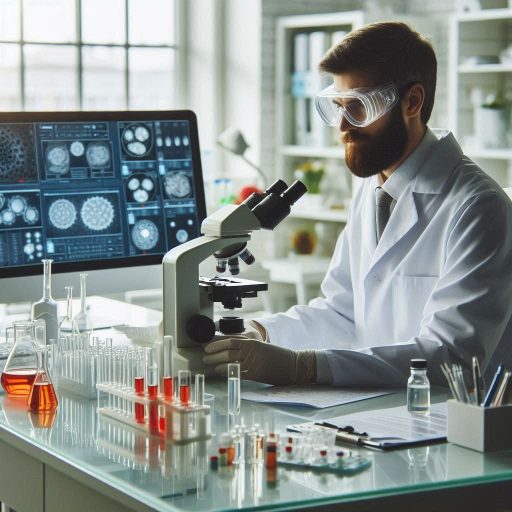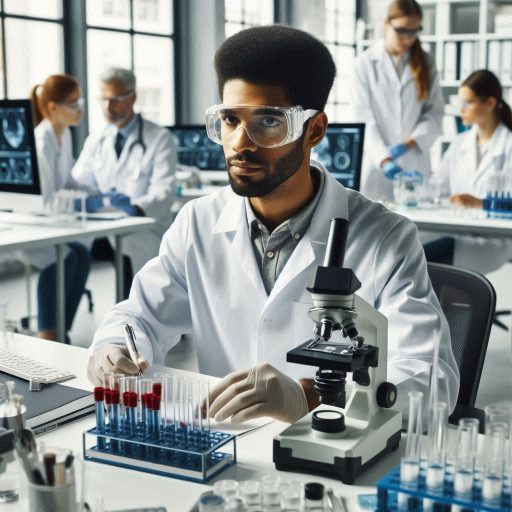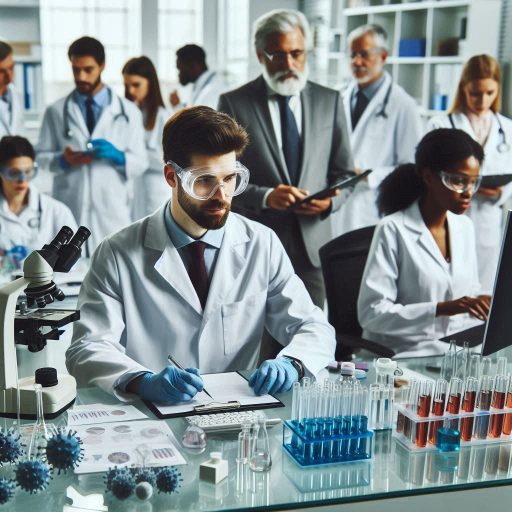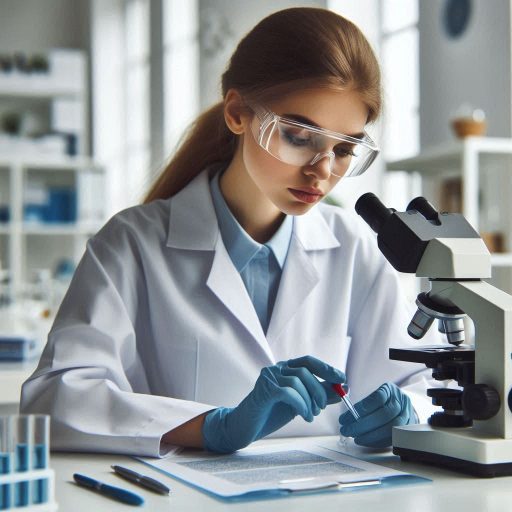Introduction
Genetics and biotechnology are two rapidly advancing fields in science.
Genetics encompasses the study of genes, heredity, and genetic variation.
On the other hand, biotechnology involves the manipulation of biological systems and organisms for practical purposes.
These fields have a profound impact on various industries such as agriculture, medicine, and environmental science.
In agriculture, genetic engineering has led to the development of genetically modified crops that are more resistant to pests and diseases, thereby increasing crop yields.
In the medical industry, biotechnology plays a critical role in the production of pharmaceuticals, vaccines, and gene therapies.
It has revolutionized the diagnosis and treatment of diseases, leading to improved outcomes for patients.
Furthermore, genetics and biotechnology are crucial in environmental science for conservation efforts, biofuel production, and bioremediation.
They offer sustainable solutions to environmental challenges and help in the preservation of biodiversity.
Genetics and biotechnology are emerging fields with far-reaching implications.
Their importance extends beyond scientific research to practical applications in various industries, driving innovation and progress in the modern world.
Historical background of genetics and biotechnology
Timeline of key discoveries and advancements
Genetics as a field of study has a rich history that dates back to ancient times.
The ancient Greek philosopher Empedocles first mentioned genetics.
He proposed that inheritance occurs by mixing elemental particles.
However, it was not until the 19th century that significant advancements were made in the field of genetics.
In 1865, Gregor Mendel, an Austrian monk, conducted experiments with pea plants and discovered the basic principles of heredity.
His work laid the foundation for modern genetics and is considered a pivotal moment in the history of the field.
Fast forward to the early 20th century, and genetics began to evolve rapidly with the discovery of DNA as the carrier of genetic information.
In 1953, James Watson and Francis Crick elucidated the structure of DNA, leading to a revolution in the field of genetics.
Since then, genetics has continued to advance at a rapid pace, with the mapping of the human genome in 2003 being a major milestone.
This achievement has opened up new possibilities for understanding genetic diseases and developing targeted therapies.
How these fields have evolved over time
Over the years, both genetics and biotechnology have undergone significant transformations, shaping the way we understand and manipulate living organisms.
Advancements in genetics have paved the way for groundbreaking discoveries in fields such as agriculture, medicine, and forensics.
Gene manipulation has revolutionized crop production, creating genetically modified organisms (GMOs) with increased resistance to pests and diseases.
In the field of medicine, genetic testing has become a powerful tool for diagnosing and treating various genetic disorders.
With the advent of gene editing technologies like CRISPR, scientists are now able to precisely modify genes, offering new hope for patients with genetic diseases.
Biotechnology, on the other hand, has played a crucial role in translating genetic discoveries into practical applications.
From the production of recombinant proteins to the development of gene therapies, biotechnology has revolutionized the way we approach healthcare and agriculture.
Biotechnology has significantly impacted environmental conservation by using bioremediation to clean polluted sites.
Bioplastics provide a sustainable alternative to traditional plastics, promoting eco-friendly solutions.
Read: Challenges and Rewards: The Dual Life of an U.S. Environmental Scientist
Applications of genetics in biotechnology
Genetic engineering and modification
have transformed biotechnology, enabling scientists to manipulate DNA for various applications.
This technology allows researchers to insert, delete, or modify genes in living organisms.
These modifications can enhance traits, such as disease resistance in crops or increased productivity in livestock.
In medicine, genetic engineering plays a pivotal role in the development of therapeutic proteins, vaccines, and gene therapies.
Gene therapy and personalized medicine
Gene therapy is another promising application of genetics in biotechnology.
It involves modifying or replacing faulty genes to treat genetic disorders.
For example, diseases like cystic fibrosis, muscular dystrophy, and certain cancers are being targeted with gene therapies.
Advances in this field hold potential to cure previously untreatable conditions by addressing their genetic causes.
Personalized medicine takes genetic information from individual patients to create tailored medical treatments.
This approach allows doctors to consider a patient’s unique genetic makeup when prescribing drugs.
Personalized medicine aims to increase treatment effectiveness and reduce adverse effects.
By analyzing genetic variations, doctors can predict how patients will respond to medications and develop more precise treatment plans.
Agricultural biotechnology and genetically modified organisms (GMOs)
Agricultural biotechnology uses genetic principles to improve the efficiency and sustainability of farming practices.
Genetically modified organisms (GMOs) are a key outcome of this field.
GMOs are plants or animals whose DNA has been altered to exhibit desirable traits.
For instance, crops can be engineered to resist pests, tolerate extreme weather, or improve nutritional content.
GMOs help increase food production, reduce pesticide use, and contribute to environmental sustainability.
The application of genetics in biotechnology is revolutionizing healthcare and agriculture.
It offers innovative solutions for disease treatment, food production, and environmental challenges.
As genetic engineering, gene therapy, and agricultural biotechnology continue to advance, they promise to reshape the future of medicine and food security.
The integration of genetics into biotechnology has led to groundbreaking innovations.
These technologies not only enhance our ability to treat genetic disorders but also improve crop yields and create more sustainable agricultural practices.
Genetic engineering, gene therapy, and GMOs represent just the beginning of what genetics can achieve in biotechnology.
The future holds even greater potential for transforming human health and the global food supply.
By leveraging genetic knowledge, biotechnology will continue to provide solutions to some of the world’s most pressing problems.
The ongoing research and development in these areas will open new frontiers in science, medicine, and agriculture.
Genetic applications in biotechnology are driving progress that will benefit both current and future generations.
Read: Job Market Trends: Future of Chemistry Jobs in America
Emerging technologies in genetics and biotechnology
In recent years, genetic research and biotechnology have grown rapidly due to advancements in gene editing and synthetic biology.
Cutting-edge sequencing technologies have also contributed significantly to this unprecedented progress.
These innovations have transformed science by providing insights into life’s mechanisms.
They also enable advances in medicine, agriculture, and environmental science.
Among the most significant breakthroughs are CRISPR-Cas9 gene editing, synthetic biology, and next-generation sequencing (NGS).
Each of these technologies has expanded the boundaries of what was previously possible, setting the stage for transformative progress in multiple fields.
CRISPR-Cas9 Gene Editing
CRISPR-Cas9 is widely recognized as a revolutionary tool in gene editing, allowing scientists to modify specific genes with unparalleled precision.
Scientists adapted this technology, which began as a natural defense mechanism in bacteria against viruses.
Now, researchers use it in various organisms, including plants, animals, and humans.
At its core, CRISPR-Cas9 operates like molecular scissors, cutting DNA at precise locations, enabling researchers to remove, replace, or add genetic material.
One of the primary advantages of CRISPR-Cas9 is its remarkable versatility.
It has been successfully applied across a wide spectrum of research areas, from basic biological studies to potential therapeutic interventions.
In the medical field, CRISPR-Cas9 offers the promise of gene therapies for genetic disorders such as sickle cell anemia, cystic fibrosis, and muscular dystrophy.
In agriculture, it has been used to create crops that are more resistant to pests and diseases, as well as to improve yields and nutritional content.
However, despite its transformative potential, CRISPR-Cas9 is not without challenges.
Ethical considerations regarding gene editing, particularly in humans, remain a subject of intense debate.
Concerns about unintended genetic changes, known as off-target effects, underscore the need for ongoing research.
We must ensure the safety and efficacy of CRISPR-based therapies.
The potential benefits of gene editing far outweigh the risks. Ongoing improvements in precision and control push the boundaries of this technology.
Synthetic Biology
Synthetic biology is another cutting-edge field that is driving innovation in biotechnology.
Unlike traditional genetic engineering, which modifies existing biological systems, synthetic biology aims to design and construct new biological systems from scratch.
By assembling genes, proteins, and other biological components in novel ways, scientists can create organisms or systems with specific, predetermined functions.
The applications of synthetic biology are vast and growing.
In biomanufacturing, scientists develop synthetic organisms.
These organisms produce pharmaceuticals, biofuels, and industrial chemicals.
They do this more efficiently and sustainably than traditional methods.
Synthetic biology in healthcare can create new diagnostic tools and treatments.
Researchers can engineer cells to detect disease conditions in the body and respond accordingly.
Synthetic biology contributes to environmental conservation by designing organisms that break down pollutants.
These organisms also help mitigate the effects of climate change.
As with CRISPR-Cas9, the rapid advancement of synthetic biology raises ethical and safety concerns.
The ability to create new life forms poses questions about biosecurity, environmental impacts, and the potential for misuse.
Next-Generation Sequencing
Next-generation sequencing (NGS) technologies have transformed genomics.
They allow scientists to sequence DNA at unprecedented speeds and lower costs.
Researchers can now study genetic variations, track organism evolution, and identify disease-causing mutations with remarkable accuracy and depth.
The sheer volume of data generated by NGS has fueled major breakthroughs in personalized medicine, cancer research, and conservation biology.
In the realm of personalized medicine, NGS has enabled clinicians to tailor treatments to the unique genetic profiles of individual patients.
Doctors analyze specific genetic mutations that drive diseases like cancer.
This allows them to prescribe more targeted therapies.
These therapies improve treatment outcomes and reduce side effects.
While the benefits of NGS are clear, the technology also presents challenges, particularly in terms of data management and interpretation.
The vast amounts of genomic data generated by NGS require sophisticated computational tools and expertise to analyze.
Moreover, as the costs of sequencing continue to decrease, ethical questions about genetic privacy and data security become more pressing.
The convergence of CRISPR-Cas9, synthetic biology, and next-generation sequencing is driving a new era of discovery in genetics and biotechnology.
These technologies provide researchers with powerful tools to manipulate and study genetic material, leading to innovations that were once considered science fiction.
As they continue to evolve, we can expect even more groundbreaking applications in medicine, agriculture, environmental conservation, and beyond.
The future of science and technology is being shaped by these advancements, and their impact on society will likely be profound.
Read: Challenges and Rewards: Navigating the Chemist Career Path
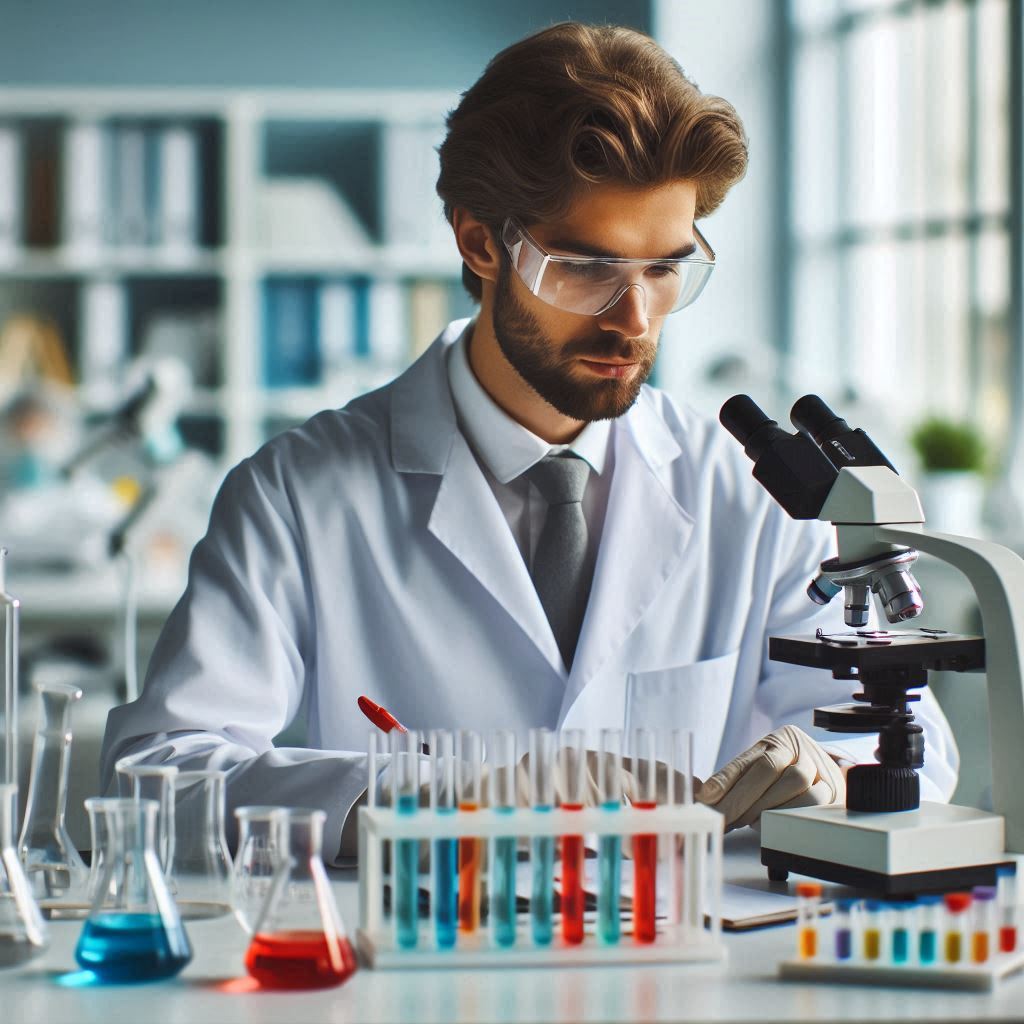
Ethical considerations in genetics and biotechnology
As the fields of genetics and biotechnology continue to advance at a rapid pace, ethical considerations have become a prominent issue.
These considerations encompass a range of topics, from the safety of genetically modified organisms (GMOs) in our food supply to the privacy and security of genetic information.
Concerns Surrounding GMOs and Food Safety
The use of genetically modified organisms (GMOs) in our food supply raises significant ethical questions.
Critics argue that GMOs may cause unintended health consequences.
They fear these organisms could introduce harmful substances into our diets.
This fear leads to concerns about the long-term safety of consuming GMOs.
Studies show mixed results on GMOs’ health impacts, creating ongoing debates among scientists.
Some studies suggest GMOs are safe, while others raise red flags.
Consumers demand transparency about GMO labeling to make informed choices.
Environmental risks also concern critics.
They argue that GMOs could harm biodiversity and disrupt ecosystems.
For example, GM crops may crossbreed with wild relatives, creating unpredictable effects.
Pesticide-resistant GMOs may lead to increased pesticide use, causing further environmental harm.
These concerns prompt calls for stricter regulations on GMO cultivation and usage.
Public perception significantly influences GMO discussions.
Many consumers express skepticism about industrial agriculture’s motives and practices.
Trust in food systems erodes when consumers lack information about food sources.
This distrust fuels the organic movement, as people seek alternatives to GMOs.
The debate about GMOs intertwines with broader issues of food justice and access.
Communities disproportionately affected by industrial agriculture often lack a voice in these discussions.
In response to these concerns, some countries impose strict regulations on GMOs.
Others take a more permissive approach, prioritizing innovation and agricultural productivity.
Policymakers face the challenge of balancing food safety, environmental sustainability, and economic growth.
They must navigate the complex landscape of public opinion and scientific evidence.
Genetic Privacy and Data Security
Another pressing ethical consideration involves genetic privacy and data security.
The rise of direct-to-consumer genetic testing kits has made genetic data widely accessible.
Many consumers eagerly submit their DNA for analysis, hoping to uncover ancestry or health risks.
However, they often overlook the potential risks of sharing this sensitive information.
Concerns arise about who accesses genetic data and how it is used.
Companies offering genetic testing may sell data to third parties without clear consent.
Individuals worry about potential misuse of their genetic data.
Insurance companies could discriminate based on genetic predispositions, leading to higher premiums.
This fear extends to employers who might use genetic information to make hiring decisions.
To address these issues, privacy regulations must adapt to evolving technologies.
Governments and organizations need robust frameworks to protect genetic data.
Individuals must remain informed about their rights regarding genetic information.
They should understand how to safeguard their genetic privacy in a digital age.
Promoting transparency in data usage will help build trust between consumers and companies.
Potential Misuse of Genetic Information
The potential misuse of genetic information raises significant ethical concerns.
Genetic data is incredibly personal, and its implications can be profound.
Many individuals fear that their genetic information could be used against them.
Genetic discrimination in employment or healthcare remains a real concern.
As genetic technology advances, the risk of misuse increases.
Genetic information could inform harmful stereotypes or biases.
For example, an employer may choose not to hire someone based on perceived genetic weaknesses.
This scenario highlights the need for legal protections against genetic discrimination.
Advocacy for ethical standards in genetic testing is essential.
Researchers and companies must prioritize informed consent and transparency.
Safeguards should be implemented to prevent unauthorized access to genetic data.
Stricter regulations can help ensure genetic information remains confidential and secure.
Ethical considerations in genetics and biotechnology are complex and multifaceted.
Ongoing debates surrounding GMOs, genetic privacy, and data security shape public opinion.
It is essential for researchers, policymakers, and the general public to engage in thoughtful discussions.
These conversations will help ensure advancements in genetics and biotechnology remain responsible and ethical.
By addressing these concerns proactively, society can navigate the ethical landscape of genetics while fostering innovation and public trust.
Read: Diverse Career Paths: From Chemist to Patent Attorney in the US
Impact of genetics and biotechnology on healthcare
Precision Medicine and Targeted Therapies
Genetics and biotechnology significantly impact healthcare through the advancement of precision medicine.
This innovative approach empowers doctors to customize treatments for individual patients based on their genetic makeup, lifestyle, and environmental factors.
By thoroughly analyzing a patient’s genetic information, healthcare providers can identify the most effective medications and appropriate dosages.
This personalized method leads to improved patient outcomes and reduces the likelihood of adverse side effects.
Biotechnology has also driven the development of targeted therapies.
These treatments specifically address the underlying causes of diseases, such as genetic mutations or abnormal proteins.
By focusing on the precise molecular pathways involved in a condition, targeted therapies provide a more efficient and effective treatment approach.
These therapies have shown promise in treating various illnesses, particularly cancer and autoimmune disorders.
Transform Your Career Today
Unlock a personalized career strategy that drives real results. Get tailored advice and a roadmap designed just for you.
Start NowDiagnosis and Treatment of Genetic Disorders
Genetics and biotechnology have improved the diagnosis and treatment of genetic disorders.
Recent advancements in genetic testing and sequencing technologies allow doctors to accurately identify genetic mutations causing hereditary diseases.
This early detection allows healthcare providers to implement proactive interventions.
These interventions can include preventive measures or personalized treatment plans that effectively manage these complex conditions.
Moreover, biotechnology has facilitated the rise of gene therapies.
These innovative treatments involve replacing or modifying defective genes to rectify underlying genetic abnormalities.
Ongoing research and clinical trials continue to enhance the potential of gene therapy.
This revolutionary approach holds promise for curing a wide range of genetic conditions that were previously deemed untreatable.
Future Implications for Healthcare and Personalized Medicine
Looking forward, the role of genetics and biotechnology in healthcare is set to expand, with significant implications for personalized medicine.
As researchers deepen their understanding of the human genome and as technology progresses, the possibilities for personalized healthcare continue to grow.
This personalized approach considers an individual’s unique genetic profile alongside their environmental influences and lifestyle habits.
Consequently, healthcare providers can deliver tailored treatments and interventions that better meet patients’ specific needs.
The integration of genetics and biotechnology into healthcare practices promises to advance medical research and innovation.
Collaborations between researchers, clinicians, and biotech companies drive new discoveries in genomics, gene editing, and synthetic biology.
These breakthroughs hold the potential to revolutionize healthcare, unlocking novel treatment options, diagnostic tools, and preventive strategies.
By embracing the latest advancements in genetics and biotechnology, the future of healthcare appears promising.
It has the potential to transform how we prevent, diagnose, and treat diseases for generations to come.
Precision medicine and targeted therapies exemplify the transformative impact of genetics and biotechnology on healthcare.
These advancements enable a shift towards personalized medicine, improving patient outcomes and quality of life.
By exploring the vast potential of genetics and biotechnology, we can enhance medical treatments.
This advancement offers new hope to patients facing complex health challenges.
Role of Genetics and Biotechnology in Agriculture
Genetics and biotechnology significantly enhance agriculture.
These fields play a crucial role in improving crop yield and resistance to pests.
Farmers increasingly rely on genetic modifications to develop high-yield crops.
These crops withstand environmental stresses, diseases, and pests.
Biotechnology enables scientists to identify and manipulate specific genes effectively.
This precision leads to crops that grow faster and produce more.
Improved crop yield and resistance
Improved crop yield directly benefits food security.
As global populations rise, increasing food production becomes essential.
Farmers can cultivate crops that require fewer resources.
This efficiency helps reduce water and fertilizer usage.
Additionally, biotechnological advancements contribute to sustainable agriculture practices.
Sustainable agriculture practices
Sustainable practices minimize the environmental impact of farming.
Genetic engineering allows for crops that require less pesticide application.
Farmers can use fewer chemicals, promoting healthier ecosystems.
Moreover, biotechnological innovations enable the development of drought-resistant crops.
These crops help conserve water resources in arid regions.
However, the rise of genetically modified organisms (GMOs) sparks debates.
Critics express concerns about potential health risks associated with GMOs.
They argue that long-term effects on human health remain unknown.
Additionally, environmental groups worry about biodiversity loss.
The introduction of GMOs may lead to reduced genetic diversity in crops.
Controversies surrounding GMOs and biotechnology in farming
Some farmers face pressure to adopt biotechnology.
Large agribusiness companies often push for GMO seeds.
This reliance can create economic challenges for small farmers.
They may struggle with high seed prices and dependency on corporations.
Public perception also plays a significant role in the biotechnology debate.
Some consumers favor organic and non-GMO products.
This preference influences market trends and farming practices.
Farmers must navigate these changing consumer demands.
Regulatory frameworks surrounding GMOs differ across countries.
In some regions, strict regulations govern GMO usage.
In others, regulations are more relaxed, allowing widespread adoption.
These disparities can create barriers for farmers.
They must understand the regulations that affect their practices.
Despite the controversies, biotechnology offers solutions for global challenges.
Climate change poses threats to agricultural productivity.
Genetics and biotechnology provide tools to adapt to these changes.
Crop varieties can be engineered to thrive in changing climates.
Genetics and biotechnology play pivotal roles in agriculture.
They improve crop yield and resistance, contributing to food security.
Sustainable practices promote responsible resource use and environmental protection.
However, ongoing debates about GMOs require careful consideration.
Balancing innovation with safety and public concerns remains essential for the future of agriculture.
Collaboration between genetics and biotechnology industries
Cross-Disciplinary Approaches and Innovations
Collaboration between geneticists and biotechnologists leads to a unique blend of expertise.
This partnership enhances the understanding of complex biological systems and accelerates scientific discoveries.
By combining their skills, these professionals push the boundaries of what is possible in the life sciences.
Innovations such as gene editing tools have emerged from this collaboration, revolutionizing how researchers manipulate genetic material.
Scientists can now edit genes with unprecedented precision and efficiency, allowing for targeted interventions in various organisms.
Techniques like CRISPR-Cas9 exemplify this groundbreaking work, making gene editing accessible to a wider range of researchers.
The integration of genetics and biotechnology allows for cutting-edge research and development across multiple disciplines.
This integration fosters innovation and promotes interdisciplinary projects that tackle significant challenges.
For instance, researchers can develop new therapies for genetic disorders by utilizing advanced gene therapies.
These therapies can correct faulty genes, potentially curing previously untreatable conditions.
Geneticists and biotechnologists collaborate to drive advancements in agriculture.
Their partnership leads to the development of genetically modified organisms (GMOs).
These innovations result in crops that are more resistant to diseases and environmental stresses, increasing food security for a growing global population.
Synergy Between Research and Development in Both Fields
Genetic research provides the foundation for biotechnological advancements in numerous industries.
Understanding the genetic basis of diseases drives targeted therapies, enabling more effective treatments.
As researchers identify genetic markers associated with diseases, they can develop personalized medicine strategies tailored to individual patients.
These strategies increase the likelihood of successful outcomes while minimizing side effects.
Biotechnology translates these genetic discoveries into practical applications across sectors, including healthcare and agriculture.
For example, the healthcare industry benefits from the production of biopharmaceuticals.
These drugs, developed through biotechnological processes, target specific genetic markers, leading to more effective treatments.
Furthermore, biotechnology plays a crucial role in agriculture by producing genetically modified crops that enhance yield and nutritional content.
These crops can thrive in challenging environmental conditions, helping to address global food shortages.
The collaboration between genetics and biotechnology accelerates progress and innovation in both fields.
This synergy streamlines the process of bringing discoveries to market, ensuring that new products and treatments reach those who need them most.
Additionally, the integration of research and development fosters an environment of creativity, where scientists can explore uncharted territories in their respective fields.
Opportunities for Growth and Innovation in the Future
The combined expertise of genetics and biotechnology opens doors for novel discoveries that could reshape our understanding of biology.
Researchers can explore new therapeutic avenues for previously untreatable conditions, such as certain cancers and genetic disorders.
Emerging fields like synthetic biology offer new avenues for collaboration and innovation.
This discipline merges biology with engineering principles, enabling scientists to design and construct new biological parts, devices, and systems.
For instance, synthetic biologists can create organisms engineered to produce biofuels, pharmaceuticals, and other valuable products.
This innovation can help address pressing global challenges, such as energy sustainability and healthcare accessibility.
As technology advances, researchers will integrate artificial intelligence (AI) and machine learning into genetic research and biotechnology.
This integration will enhance innovation significantly.
AI can analyze vast amounts of genetic data, identifying patterns and relationships that may not be immediately evident to human researchers.
This capability will accelerate the pace of discovery and provide insights that can inform both research and practical applications.
The potential for growth and innovation in the fields of genetics and biotechnology is vast and exciting.
The ongoing collaboration between geneticists and biotechnologists will continue to yield groundbreaking discoveries and applications.
Experts in these fields will shape the future of science, technology, and society.
Their collaboration will improve health outcomes and enhance agricultural practices. Together, they will create a more sustainable world.
The journey of exploration and discovery has only just begun, and the possibilities are truly limitless.
Conclusion
Genetics and biotechnology are revolutionizing fields, reshaping how we understand and manipulate living organisms.
Advances in genetics have allowed us to uncover the mysteries of DNA, unlocking the secrets of heredity.
Biotechnology has enabled us to engineer crops resistant to pests, leading to increased yields and improved food security.
Gene editing technologies like CRISPR-Cas9 offer the potential for precise modifications in organisms, from plants to humans.
These emerging fields have the power to address global challenges such as food shortages, disease, and environmental degradation.
By harnessing genetic information, scientists can develop personalized medicine for individuals, improving treatment outcomes and reducing side effects.
Moreover, biotechnology plays a crucial role in the production of biofuels, pharmaceuticals, and other valuable products.
The integration of genetics and biotechnology into various industries is driving innovation and economic growth worldwide.
As we move forward, the impact of these fields on society and the economy will continue to expand.
Genetics and biotechnology are shaping the future of science, medicine, agriculture, and industry.
Their potential to revolutionize our understanding of life and transform our world is immense.
[E-Books for Sale]
The Big Book of 500 High-Paying Jobs in America: Unlock Your Earning Potential
$19.99 • 500 High-Paying Jobs • 330 pages
Explore 500 high-paying jobs in America and learn how to boost your career, earn more, and achieve success!
See All 500 High-Paying Jobs of this E-Book
1001 Professions Without a Degree: High-Paying American Jobs You Can Start Now
$19.99 • 1001 Professions Without a Degree • 174 pages
Discover 1001 high-paying jobs without a degree! Unlock career tips, skills, and success strategies for just $19.99!

